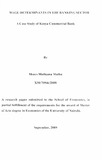Wage determinants in the banking sector: A case study of Kenya Commercial Bank
| dc.contributor.author | Mathu, Moses M | |
| dc.date.accessioned | 2013-05-09T07:13:58Z | |
| dc.date.available | 2013-05-09T07:13:58Z | |
| dc.date.issued | 2009 | |
| dc.identifier.citation | Master of Arts degree in Economics of the University of Nairobi. | en |
| dc.identifier.uri | http://erepository.uonbi.ac.ke:8080/xmlui/handle/123456789/20550 | |
| dc.description.abstract | The labour market in Kenya today is more competitive than ever before. With the upgrading of the local colleges into fully fledged universities continue to release thousands of fresh graduates into the labour market every year. The government raised the retirement age of the public servants from 55 years to 60 years while the employer requires years of experience before hiring employees. There is increased disparity 111 wages among staff performing same duties and also across the industry resulting 111 movement of employees from one bank to another in search of better opportunities. The question of what determines wages in the Kenyan banking sector therefore becomes an important one This paper investigated the determinants of wages in Kenya Commercial Bank (KCB). The study utilized primary cross-sectional data that were collected from members of stair of KCB by use 0 [structured questionnaire. The study adopted the earning function that was estimated based on the human capital model as stated by Mincer (1974). Ordinary least squares technique was used to estimate the regression function. The results indicated that in experience, years of schooling, grade and union were the main determinants of wages. | en |
| dc.language.iso | en | en |
| dc.publisher | University of Nairobi | en |
| dc.title | Wage determinants in the banking sector: A case study of Kenya Commercial Bank | en |
| dc.type | Thesis | en |
| local.publisher | School of Economics | en |

